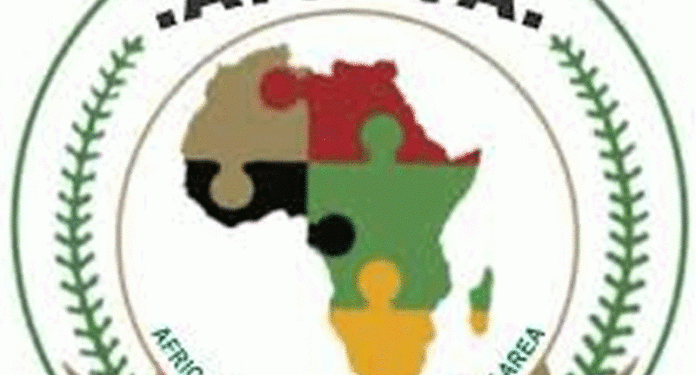AfCFTA: Six strategic levers for growing Regional Value Chains; driving a made in Africa revolution
Through substantially reducing tariffs, developing and enforcing RoOs, liberalizing services – particularly trade-enabling services, harmonizing national and regional standards, reducing NTBs, and enhancing Trade Facilitation, the AfCFTA will enable the widening and deepening of RVCs, engendering a Made in Africa Revolution.
This is necessary to ensure that not only is there greater trade within the continent, but that there is a sea change in growth and job creation through greater value addition and structural change towards higher productivity sectors which generate jobs.
The AfCFTA underpins the development of RVCs and, ultimately, a made in Africa revolution, through serving as an overarching framework with the following six levers:
- Tariff Phase Down
Liberalizing tariffs helps to create demand, increasing market size and enabling economies of scale. However, it is the tariff on inputs that is equally, if not more, important.
The average tariff on intermediates across African countries is around 10%, having fallen slowly over the past 15 years, but this figure is still roughly twice the average for other developing country regions, being a legacy of a historic pursuit of inward-looking industrialization strategies.
For sectors such as iron and steel and the automotive sector, high tariffs on intermediate goods (e.g. wires, bars, rods) prevent greater regional manufacturing and processing, being undermined by competition from cheaper imports.
- Appropriate and Harmonized RoOs
Appropriate and harmonized Rules of Origin (RoOs) are central to ensuring that RVCs are able to benefit from tariff preferences, without distorting their production decisions.
The high thresholds for local content, going up to 40% for some products, serve to illustrate how RoOs will incentivize Made in Africa, whilst the tariff preferences on offer for originating goods act as a further catalyst.
Accordingly, it is encouraging to see that as of July 2021, 86% of the AfCFTA RoOs have been agreed, while negotiations on the outstanding 14% (2% issues scatted across multiple sectors, 10.5% in textiles and 1.4% in automotive) are ongoing.
In terms of particular sectors, it is notable that considerable parts of Harmonized System (HS)
Textiles, clothing, and motor vehicles have long been identified as prime candidates for RVC development in Africa and it is hoped that the AfCFTA will encourage this.
As such, it is important for stakeholders in these sectors to mobilize their resources to finalize RoOs, and in so doing, enable RVC development.
- Enabling Services
According to UNCTAD, services make up over half of Africa’s combined GDP, at 55%. The share of services in African trade reached 22% in 2016.
Services are a key diversification pathway and have a transformative effect on other sectors such as manufacturing and agriculture, making production more efficient.
The services sector contributes significantly to African GDPgrowth. In 2017, services made up 75% of Africa’s Foreign
Direct Investment (FDI).
Additionally, liberalization of trade in services enables the formation of RVCs and the structural transformation they can drive. Five sectors have been prioritized for liberalization in the first phase. These are: Financial, Communication, Transport, Tourism, and Business services. Services are a key component of the commercial viability of any VC.
- Harmonizing Standards
The elimination of tariff barriers and NTBs, and harmonization of standards called for under the AfCFTA represent a unique opportunity to boost intra-regional trade and investment.
AfCFTA Protocols on Sanitary and Phytosanitary (SPS) Measures and on Technical Barriers to Trade (TBT) will play a key role in this regard.
- Removal of Non-Tariff Barriers
The AfCFTA specifically addresses NTBs and the effect they have on competitiveness, cost and transit times for intra-African trade.
A meaningful in the prevalence of NTBs would have a significant and positive impact for AfCFTA State Parties.
The UNECA 2019 ARIA Report illustrates the high costs of NTBs and TBT in Africa’s manufacturing sectors. Addressing these barriers will go a long way in establishing RVCs.
- Enhanced Trade Facilitation
The AfCFTA explicitly addresses Trade Facilitation in Annex 4 of the Trade in Goods Protocol. Enhanced Trade Facilitation will lead to significant real income gains, and significantly decrease the high costs of trade and transit within Africa, and in so doing, make it easier to establish RVCs and attract investment.
New research emerging out of UNDP and Africa Investor (2021) confirms that streamlining regulation in support for AfCFTA implementation could not only act as a stimulus for Africa’s post-Covid-19 recovery, but it would also save governments $17 billion in costs and earn businesses $500 billion in revenues.
Trade Facilitation is the most resource-intensive to realize in its entirety, as it includes (amongst other measures), establishing soft border infrastructure, modernization and digitalization of customs management and border administration systems, as well as attendant staff capacity-building.
Though the initial challenges are daunting, this category has the best return on investment. A recent study by the Trade Law Centre (tralac) calculated that if the time for trucks to deliver goods in Africa was decreased by just 20%, this would increase intra-African trade by a greater percentage increase than fully liberalizing all intra-African trade.







